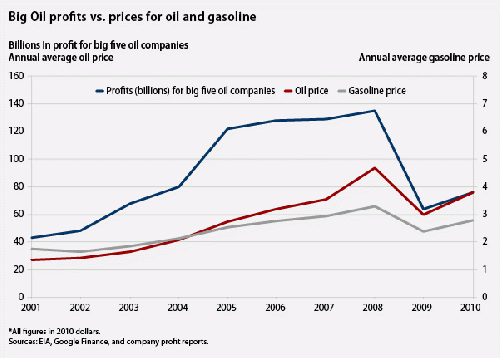Why do oil producing companies raise gasoline prices when crude oil prices increase? The answer seems self evident. Higher raw material cost should justify increases in finished product prices. However, the oil companies make enormous additional profits during times of price increases for crude oil. By comparison, if the price of agricultural commodities go up, neither the food processing companies nor the retailers experience such enormous increases in profits. The explanation lies in the differences in the distribution chain of these two industries as well as sleight of hand creative accounting and tax planning.
The food industry chain of distribution starts with the farmer who then sells to the food processing company who then sells their products to distributors and retailers. In that distribution chain, each level of the distribution chain is owned by separate companies. The farmers including corporate farmers sell to the food processors like Heinz and Kraft who pass on any increases from the farmer to the distributors and retailers. The idea is to maintain a consistent gross profit percentage. Additional profits generally come from sales increases and do not come from price increases.
The oil companies on the other hand own the entire distribution chain. They drill and extract the oil and transfer the crude oil to their refineries who then take their finished products of refined oil and gasoline and then sell it to distributors and retailers most of which are also owned by the same oil companies. When the price of crude oil goes up, the oil companies do not have any real increases in their cost of extracting the oil. Therefore, their cost of production does not increase with increased prices. Accordingly, the entire increase in crude oil prices goes directly to their bottom line. Why then do these companies claim that they are just passing on the extra cost to their retail prices? Here is where the creative accounting and foreign tax loopholes come into play.
Even though the oil companies own their own refineries, they charge a transfer price to the refineries based upon the market price of crude oil. The refineries process the crude into refined oil and gasoline at the artificially elevated prices. The refineries then sell this high priced product to the distributors and retail gas stations whose owners are either the independent retailer or the stations owned by the oil companies. The gas stations then mark up the cost by 10-15 cents per gallon.
Therefore, the oil companies charge their own companies the increased price of crude oil and that is how they justify increasing the prices of their finished product yet their cost of producing the oil has not changed. For example: Exxon-Mobil has a relatively fixed cost of drilling and extracting oil. Assuming their cost of extraction is $30/barrel. Every increase in oil prices increase their bottom line dollar for dollar. The current price of crude oil is about $110/barrel. In addition to the additional price they receive for crude oil, they add on a fictitious cost increase to retail gasoline when they have not really had increased costs. In fact they have experienced windfall profits at the crude oil level and falsely justified increases in retail prices as well. So they reap additional profits from the increase in crude oil prices as well as the artificial increase in retail gas prices. They do this through the magic of transfer pricing to themselves and they get to avoid taxes as well.
Remember, the oil companies own the entire chain of distribution from extraction to retail sales. However, the drilling and extraction process is done by a company which is usually located in a foreign country. That company then sells its crude oil that cost $30/barrel for $110/barrel to another controlled company which then refines the oil. The refinery adds its refinery cost to the already inflated $110 crude oil price and then transfers that price to the retailer who then adds another level of profit. However, the end product has not been sold to anyone outside the company yet. If one collapses this entire facade, the oil company's cost per barrel is still $30 and once the product is sold to the public, the price they are selling the oil and gasoline has been marked up to $110+refining costs+retail markup. Assuming the total of all the internal markups is $150, the oil company has a profit per barrel of $150 less their cost of production, refining, and distribution.
A careful analysis clearly shows that increases in the price of crude oil does not increase any costs of production and only creates windfall profits. All of this is lost in the internal accounting and artificial transfer pricing. In addition to all of that chicanery, most of the profits that the oil companies make are from the transfer pricing to the refineries. The profit on these sales is usually nested in a foreign corporation and is not taxed until it is repatriated to a U.S. company. It is unlikely that these windfall profits will ever be repatriated and will probably escape U.S. taxes permanently. That is why many of the oil companies pay no U.S taxes and it is absolutely legal.
The last phase of this scandal is when Wall Street packages securities based upon the future price of crude oil. Agricultural commodity futures are securitized by option writers who generally work in the banking industry. Option writers pay the farmer an option premium to fix the price of their crops. These options are then traded on various exchanges and are generally bought by speculators or companies who want to hedge the price of their food costs such as food processors. These agricultural futures go up in price when there is a real shortage created by environmental circumstances such as weather or crop failures.
(Note: You can view every article as one long page if you sign up as an Advocate Member, or higher).





